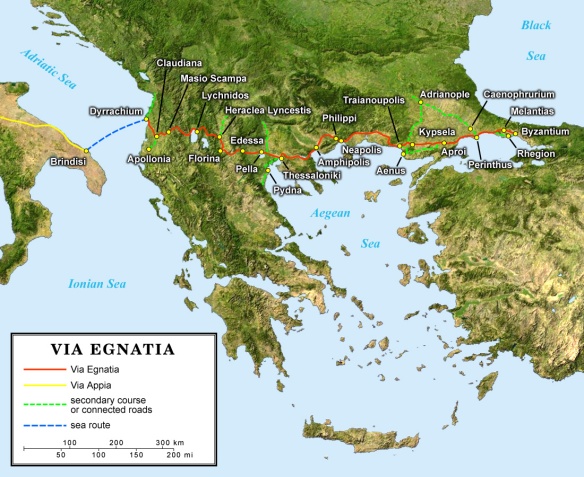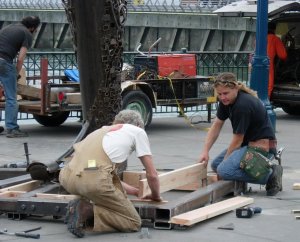 One morning last week as I was thinking about what book of the Bible might be good to re-read next, Paul’s epistle to the Philippians popped into my mind.
One morning last week as I was thinking about what book of the Bible might be good to re-read next, Paul’s epistle to the Philippians popped into my mind.
“What do you know about the people and place Philippians was written to?” the Lord asked me.
“Not much,” I replied. “Uh – why should I care, exactly?” Not being rude, I was just curious.
“Why don’t you see what you can learn about them?” he suggested.
Okay, I thought, why not. So I approached the subject like Sherlock Holmes might: who, what, where, when, why, how – like that. Here’s some of what I’ve learned so far:
A bit of background
While Paul was in house arrest in Rome, he did more than boldly proclaim the gospel to anyone and everyone (Acts 28:30-31), he also wrote at least four letters which scholars refer to as the “prison epistles”: Ephesians, Colossians, Philippians and Philemon.
First-century house arrest wasn’t your typical American prison; however, it wasn’t a vacation home either. It’s purpose was to serve as a holding tank for prisoners awaiting trial. Two years was the maximum amount of time someone could be held, at which time they were either tried, found guilty and executed, or released.
Although guards were always nearby, prisoners were allowed much freedom such as access to visitors and limited access outside the home. “The apostle was under the charge of these troops (i.e. praetorian guard), the soldiers relieving each other in mounting guard over the prisoner, who was attached to his guard’s hand by a chain. In the allusion to his bonds, Ephesians 6:20, he uses the specific word for the coupling-chain. His contact with the different members of the corps in succession, explains the statement that his bonds had become manifest throughout the praetorian guard.” http://www.studylight.org/commentaries/vnt/view.cgi?bk=49&ch=1
Probably the most difficult part was that prisoners were responsible for payments, such as their rent, food, and so on. This was obviously tricky for someone who was not allowed to work for a wage. In fact scholars say that numerous prisoners died in house arrest due to lack of food.
So what was Paul to do? Enter the Philippian church. As Paul was in house arrest completely dependent upon the financial gift of others to keep him alive in prison, the church at Philippi stepped up by sending a man named Epaphroditus with a financial gift (Philippians 4:18). (This wasn’t the first time the church financially came to Paul’s aid. In a number of letters Paul mentions the grace-filled generosity of the Philippian church in providing for his needs time and time again: Philippians 4:15-16; 2 Corinthians 8:1-5; 11:7-9. )
Epaphroditus didn’t travel 800 miles to just bring Paul money, but he also came with news about the health of the Philippian church. Apparently the persecution Paul faced in Philippi more than 10 years earlier was still on-going against the believers in Philippi (Philippians 1:29-30). And, not only was the church facing trouble from the outside, but they were also experiencing great disunity and conflict on the inside between one another (Philippians 1:27; 2:3-4,14; 4:2-3).
In light of these threats on the church Paul writes them a letter (what we know to be the book of Philippians), gives it to Epaphroditus and sends him back to Philippi with it (Philippians 2:25-30).
Source: http://www.brookhills.org/gathering/reading_guide_archive.html?id=15
Miscellaneous thoughts about Philippi
“But even after that we had suffered before, and were shamefully entreated, as ye know, at Philippi, we were bold in our God to speak unto you the gospel of God with much contention.” (I Thess. 2:2 KJV)
This entire chapter describes how Paul lived and preached, both at Thessalonica and previously at Philippi, and what happened because of that – persecution.
In Philippi it had been by Romans – who were upset at losing their demonic source of income and needed a way to get it back.
In Thessalonica it was by the Jews – who disagreed with Paul’s message about Jesus and continued to follow him from town to town.
In Paul’s vision (Acts 16), he saw a Macedonian man calling him to come and help. It wasn’t a man of any specific city or country, but the entire region, what we know today as the country of Greece and other Balkan nations. This was the doorway into Europe…
Source: http://en.wikipedia.org/wiki/Philippi
From Smith’s Bible Dictionary: “Achaia signifies in the New Testament a Roman province which included the Peloponnesus and the greater part of Hellas (Greece) proper, with the adjacent islands. This province, with that of Macedonia, comprehended the whole of Greece; hence Achaia and Macedonia are frequently mentioned together in the New Testament to indicate all of Greece. Ac 18:12; 19:21; Ro 15:26; 16:5; 1Co 16:15; 2Co 7:5; 9:2; 11:10; 1Th 1:7,8 In the time of the emperor Claudius it was governed by a proconsul, translated in the Authorized Version “deputy,” of Achaia. Ac 18:12.”
Note: Macedonia was the northern region of Greece. Philippi, Thessalonica and Berea were there. Hellas was the southern region, before reaching Achaia. Athens was there. The Peloppones peninsula is the western and southern-most region of Greece. Corinth was there.
Paul had not intended to go into that part of the world, at least not yet. He had intended to go into the northern part of Asia Minor (Turkey today). Somehow, we are not told exactly how, the Holy Spirit wouldn’t let him go that direction. But he continued his travels and changed directions as necessary, being hindered from first one place, then another. He wound up going west, instead of north.
It was important to God that Paul take the gospel that way next – into Europe. Why? Who was there, that God wanted to reach? Perhaps Romans?
Acts 16 (NIV) (notes in parentheses are mine):
“6 Paul and his companions traveled throughout the region of Phrygia and Galatia, having been kept by the Holy Spirit from preaching the word in the province of Asia. 7 When they came to the border of Mysia, they tried to enter Bithynia, but the Spirit of Jesus would not allow them to. 8 So they passed by Mysia and went down to Troas. 9 During the night Paul had a vision of a man of Macedonia standing and begging him, “Come over to Macedonia and help us.” 10 After Paul had seen the vision, we got ready at once to leave for Macedonia, concluding that God had called us to preach the gospel to them.
11 From Troas we put out to sea and sailed straight for Samothrace (an island in the Aegian Sea), and the next day we went on to Neapolis. (A port city, now called Kavala. The Roman road Via Egnatia began/ended here originally, extended on to Byzantium shortly before Paul’s visit.) 12 From there we traveled to Philippi, a Roman colony and the leading city of that district[a] of Macedonia. And we stayed there several days.”
Another source: Marvin Vincent Word Studies of the book of Philippians.
http://www.studylight.org/commentaries/vnt/view.cgi?bk=49&ch=1
About the City of Philippi
Philippi was a city in eastern Macedonia, established by the king of Macedon Philip II in 356 BC and abandoned in the 14th century after the Ottoman conquest. The present municipality Filippoi is located near the ruins of the ancient city and it is part of the region of East Macedonia and Thrace in Kavalla, Greece. Philippi was established on the site of the Thasian colony of Krinides or Crenides (“Fountains”), near the head of the Aegean Sea at the foot of Mt. Orbelos about 8 miles north-west of Kavalla, on the northern border of the marsh that in Antiquity covered the entire plain separating it from the Pangaion hills to the south of Greece.
The objective of founding the town was to take control of the neighboring gold mines and to establish a garrison at a strategic passage: the site controlled the route between Amphipolis and Neapolis, part of the great royal route which crosses Macedonia from the east to the west and which was reconstructed later by the Roman Empire as the Via Egnatia.
Philip II endowed the new city with important fortifications, which partially blocked the passage between the swamp and Mt. Orbelos, and sent colonists to occupy it. Philip also had the marsh partially drained, as is attested by the writer Theophrastus. Philippi preserved its autonomy within the kingdom of Macedon and had its own political institutions (the Assembly of the demos). The discovery of new gold mines near the city, at Asyla, contributed to the wealth of the kingdom and Philip established a mint there. The city was finally fully integrated into the kingdom under Philip V. The city contained about 2,000 people at that time.
More about Philippi
Philippi was in a strategic location — it commanded the land route to Asia Minor. The city was also important because of the gold mines in the nearby mountains.
In 42 B.C., it became the site of one of the most crucial battles in Roman history. In that battle, the forces of Antony and Octavian (cf. Luke 2:1) defeated the republican forces of Brutus and Cassius. The battle marked the end of the Roman republic and the beginning of the Roman Empire.
Antony and Octavian settled many of their army veterans at Philippi, which was given the coveted status of a Roman colony. Later, other army veterans settled there.
Being a Roman colony, Philippi was governed by Roman laws and subject to Roman rule. Citizens of Philippi were Roman citizens, exempt from paying certain taxes and not subject to the authority of the provincial governor. It was a little Rome in the midst of a Greek culture, just as the church is a “colony of heaven” here on earth (Philippians 3:20).
Events leading up to the founding of the church
- Paul was on his second preaching trip and he visited the churches established on his first trip (Acts 15:36; 16:5).
- The Holy Spirit prevented Paul from turning aside to Asia or Bithynia and he journeyed to Troas (Acts 16:6-8).
- The Macedonian vision directed Paul to go into Europe (Acts 16:9-10).
- Paul went to Philippi and searched for a synagogue (Acts 16:11-13). (There wasn’t one.) Though the initial converts were Jews or Jewish proselytes, Gentiles made up the majority of the congregation. The fact that there was no synagogue is evidence that the city’s Jewish population was small.
- The church began with the conversion of Lydia at a meeting of Jewish women.
About the church at the time of the letter
The 10 year old Philippian church had its share of problems. At the time of Paul’s letter, its members were desperately poor, they were being persecuted for the cause of Christ, they were being attacked by false teachers, and there was a feud between two prominent women in the congregation.
Source: www.lawofliberty.com/sermons/Resources/thechurchatphilippi.pdf
About Paul’s letter to the Philippians
The early church was unanimous in its testimony that Philippians was written by the apostle Paul (see 1:1). Internally the letter reveals the stamp of genuineness. The many personal references of the author fit what we know of Paul from other New Testament books.
It is evident that Paul wrote the letter from prison (see 1:13–14). Best evidence favors Rome as the place of origin and the date as c. 61. This fits well with the account of Paul’s house arrest in Acts 28:14–31. When he wrote Philippians, he was not in the Mamertine dungeon as he was when he wrote 2 Timothy. He was in his own rented house, where for two years he was free to impart the gospel to all who came to him.
Paul’s primary purpose in writing this letter was to thank the Philippians for the gift they had sent him upon learning of his detention at Rome (1:5; 4:10–19). However, he makes use of this occasion to fulfill several other desires:
- To report on his own circumstances (1:12–26; 4:10–19);
- To encourage the Philippians to stand firm in the face of persecution and rejoice regardless of circumstances (1:27–30; 4:4);
- To exhort them to humility and unity (2:1–11; 4:2–5);
- To commend Timothy and Epaphroditus to the Philippian church (2:19–30); and
- To warn the Philippians against the Judaizers (legalists) and antinomians (libertines) among them (ch. 3).
Christian citizens of Philippi, mostly non-Jews. The city of Philippi (see map) was named after King Philip II of Macedon, father of Alexander the Great. It was a prosperous Roman colony, which meant that the citizens of Philippi were also citizens of the city of Rome itself. They prided themselves on being Romans (see Acts 16:21), dressed like Romans and often spoke Latin. Many were retired military men who had been given land in the vicinity and who in turn served as a military presence in this frontier city.
That Philippi was a Roman colony may explain why there were not enough Jews there to permit the establishment of a synagogue and why Paul does not quote the OT in the Philippian letter.
- Philippians contains no Old Testament quotations.
- It is a missionary thank-you letter in which the missionary reports on the progress of his work.
- It manifests a particularly vigorous type of Christian living: self-humbling (2:1–4); pressing toward the goal (3:13–14); lack of anxiety (4:6); ability to do all things (4:13).
- It is outstanding as a letter of joy; the word “joy” in its various forms occurs some 16 times.
- It contains one of the most profound Christological passages in the New Testament (2:5–11).
- Greetings (1:1–2)
- Thanksgiving and Prayer for the Philippians (1:3–11)
- Paul’s Personal Circumstances (1:12–26)
- Exhortations (1:27—2:18)
- Living a Life Worthy of the Gospel (1:27–30)
- Following the Servant Attitude of Christ (2:1–18)
- Paul’s Associates in the Gospel (2:19–30): Timothy (2:19–24); Epaphroditus (2:25–30)
- Warnings against Judaizers and Antinomians (3:1—4:1) (Antinomian: the view that Christians are released by grace from the obligation of observing the moral law.)
- Exhortations concerning Various Aspects of the Christian Life (4:2–9)
- Concluding Testimony and Repeated Thanks (4:10–20)
- Final Greetings and Benediction (4:21–23)
Source: http://www.biblica.com/en-us/bible/online-bible/scholar-notes/niv-study-bible/intro-to-philippians/
Having gotten that far, I thought I should do more study on the letter itself. So far I’ve read several translations and a few commentaries, plus some word studies by a couple of notable scholars. I’ll share my thoughts about all that in a separate post one day. It has turned out to be a really interesting investigation.
So, why should I care about the people and place of Philippi?
They are a lot like believers today. Men and women, a mixture of races, ages, cultures and financial status, from a variety of religious backgrounds.
Many were military, active duty or retired. Many of those were landowners. No doubt some were civil workers for the Roman government, workers in the nearby gold and silver mines, or tradesmen and shopkeepers serving the thousands of travelers coming through this crossroads between continents. Some were most probably slaves, and some were slave owners. Rich and poor, all were citizens of Rome, the most powerful empire on earth.
They were a melting pot – a lot like America. But there is yet one difference between the Philippians and American believers, at least for the present:
All of them were being persecuted for their faith.
 “Wherefore, my beloved, as ye have always obeyed, not as in my presence only, but now much more in my absence, work out your own salvation with fear and trembling. For it is God which worketh in you both to will and to do of his good pleasure.” (Phil. 2:12-13 KJV)
“Wherefore, my beloved, as ye have always obeyed, not as in my presence only, but now much more in my absence, work out your own salvation with fear and trembling. For it is God which worketh in you both to will and to do of his good pleasure.” (Phil. 2:12-13 KJV)




 One morning last week as I was thinking about what book of the Bible might be good to re-read next, Paul’s epistle to the Philippians popped into my mind.
One morning last week as I was thinking about what book of the Bible might be good to re-read next, Paul’s epistle to the Philippians popped into my mind. 